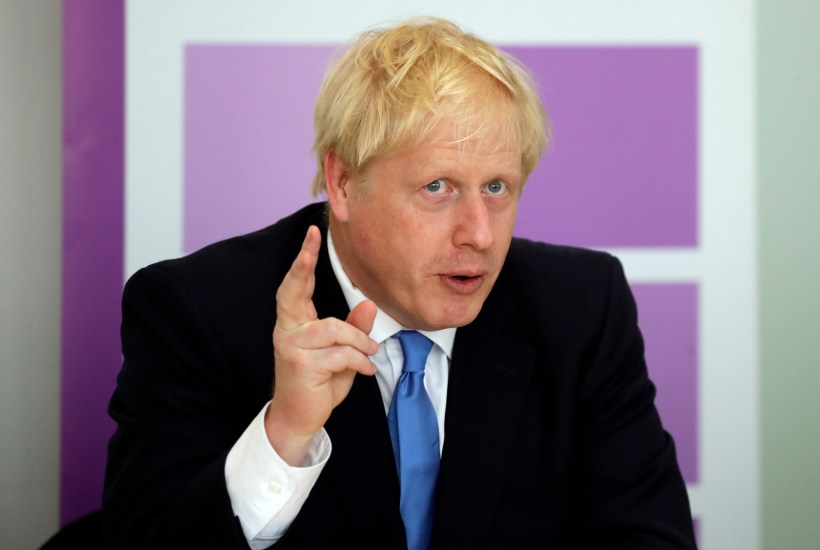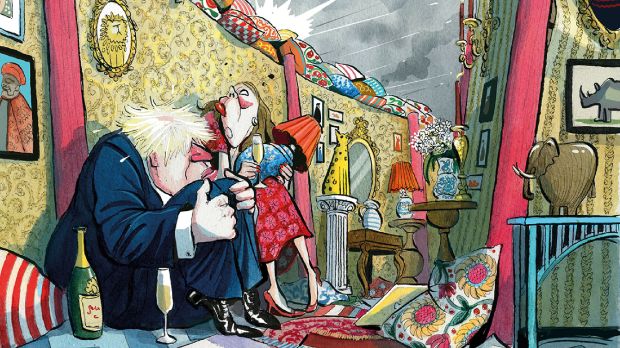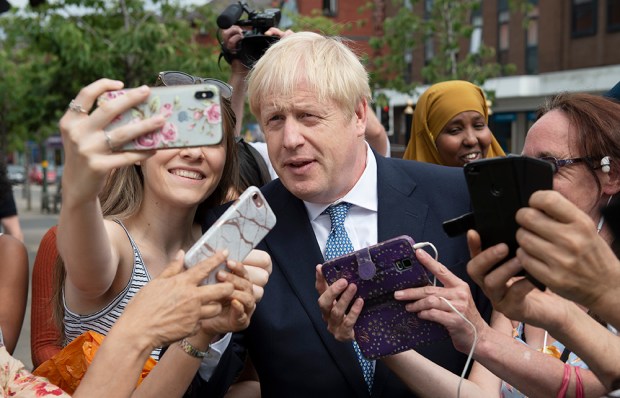There were many Brexiteers who were urging Boris Johnson to travel to Washington before he went anywhere else, to underline that Britain’s most important relationship is with the United States. And if the EU felt nervous seeing the UK cosy up to America, so much the better. But the Prime Minister’s first visit was to Berlin, and then to Paris, to see if a Brexit deal can be negotiated and the needless disruption of a no-deal exit avoided. It seems, at present, a rather long shot.
Theresa May famously said little in one-to-one meetings with European leaders. Boris Johnson can be a lot more forthright, and should speak with candour about his own lack of room for manoeuvre. Even if he had been persuaded about the merits of the EU’s last offer (which, after all, he voted for in the end), it was rejected three times by parliament, and by historic margins. This is why a new deal is needed.
On one level, it seems strange — almost baffling — to think that a no-deal Brexit could be pushed through simply because politicians cannot swallow their pride. Leo Varadkar, in particular, has talked himself into a corner on the Irish backstop: to compromise now would be very difficult for him. But if there were a no-deal Brexit, Ireland would suffer. The mutual interdependence of our islands is such that 41 per cent of Ireland’s exports to the EU go through Britain: we have a common interest in minimising that disruption and in finding a compromise that puts people first and political games second.
The Brexiteers were naive to think such practical concerns would govern these negotiations. Look at German carmakers, ran the argument, look at that Dutch report saying a no-deal Brexit would mean a £30 billion hit to the economy of the Netherlands. Surely they’ll sign a deal! But the EU is a political project more than an economic one. It has responded with unity and discipline to the Brexit talks. Its main objective is not so much to strike a good deal with the UK as to show the world that the EU is undaunted and united.
Angela Merkel is a natural friend of Britain, and made sure (for example) that the latest extension to Britain’s EU membership did not come with any strings attached. She is also realistic about the nature of the EU and its pride. The best way for Boris Johnson to get a Brexit deal is to show (or fake) some humility. He would have to ditch a demand or two, and visibly make concessions. The EU is then more likely to encourage Dublin to do the same.
German diplomats have been quietly urging the British to behave in this way. Look at Greece in 2015, they argued: Yanis Varoufakis, the finance minister, played hardball and lost. He even held a referendum, to show that the Greek public rejected the EU’s bailout terms. But this had the reverse effect to the one he desired. The EU held firm, thinking that if it compromised, there would be a lot more of these referendums and it would end up getting pushed about by voters. So Varoufakis quit and the Greek parliament pushed through the EU bailout. Varoufakis’s referendum was a powerful gesture, a cri de coeur. But as a negotiating strategy, it failed.
The Boris gambit is similar: to demand a ‘total backstop-ectomy’ and say that parliament will settle for nothing less. In Brussels, this will be seen as a Greek-style attempt to pressure the EU. It will probably again resist such pressure and hope to ally with Tory rebels in parliament. It will wait to see if Dominic Grieve and his band of rebels can defeat Boris, in the same way that the Greek parliament defeated Varoufakis.
The plan might work. Jeremy Corbyn may throw in his lot with the anti-Brexit Tories, joined by the SNP and the Liberal Democrats. But these groups have been at each other’s throats all summer, and have so far been unable to agree on anything. Even John Bercow hasn’t been able to explain exactly how parliament could block a no-deal Brexit. With ten weeks to go, no one has been able to prove that any parliamentary tool exists that could derail Brexit by 31 October.
Boris Johnson has been trying to make this point to his French and German counter-parts this week. Even if he is brought down by a vote of confidence, he could delay a general election until after Brexit. That may be an outrageous affront to many, but if he holds an election before we leave then the Brexit party will still be at large; the Tory vote would be decimated and the party possibly destroyed. No one likes to admit it, but Nigel Farage has once again changed every-thing. Fear of the Brexit party means the Tories cannot risk an election before delivering on their manifesto promise on Brexit.
The G7 summit, held in Biarritz this weekend, is always a bit of an illusion. It is not a place where big decisions are made, because democratic leaders cannot, between them, collude on any serious form of action. Everyone is hemmed in by what their politicians and electorates will allow. This is true with regards to Britain leaving the EU: Boris Johnson cannot delay or dilute Brexit and expect his party to survive the next election. If the EU is serious about refusing to compromise on the backstop, then the only discussion to be had is how best to deal with a no-deal Brexit.
Got something to add? Join the discussion and comment below.
Get 10 issues for just $10
Subscribe to The Spectator Australia today for the next 10 magazine issues, plus full online access, for just $10.
You might disagree with half of it, but you’ll enjoy reading all of it. Try your first month for free, then just $2 a week for the remainder of your first year.














Comments
Don't miss out
Join the conversation with other Spectator Australia readers. Subscribe to leave a comment.
SUBSCRIBEAlready a subscriber? Log in